No party won a majority of legislative seats in yesterday’s elections, with the Democratic Progressive Party (DPP) taking 51 seats and the Chinese Nationalist Party (KMT) taking 52 seats.
During the campaign, the DPP vowed to secure more than half of the Legislative Yuan’s 113 seats, while Taiwan People’s Party (TPP) Chairman and presidential candidate Ko Wen-je (柯文哲) said that his party aimed to grab at least 10 seats. Neither met their goals.
None of the TPP’s candidates won seats in regional legislative elections.
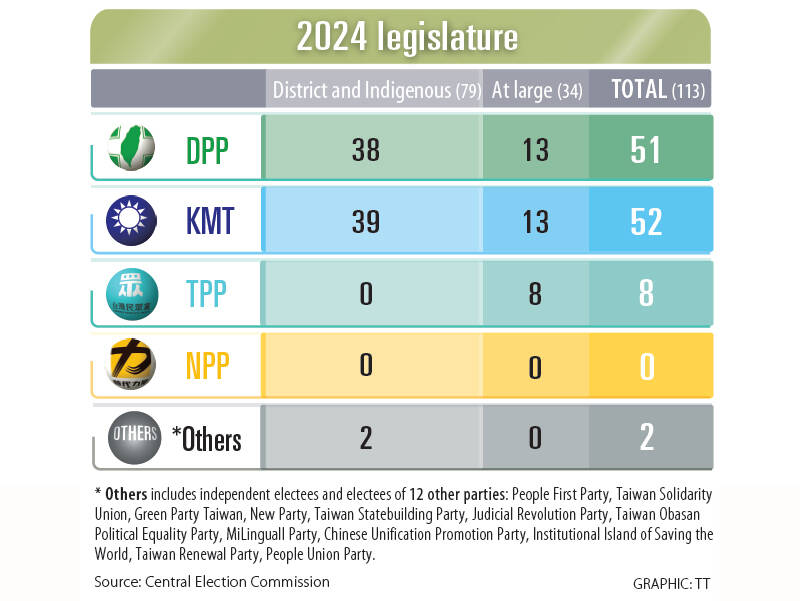
The DPP won all eight of Kaohsiung’s districts, as well as the six districts in Tainan.
Kaohsiung City Councilor Huang Jie (黃捷) — who joined the DPP last year and was nominated for Kaohsiung’s sixth electoral district after DPP Legislator Chao Tian-lin (趙天麟) dropped out of the race due to an extramarital affair — upset KMT Kaohsiung City Councilor Chen Mei-ya (陳美雅).
In Taipei’s fourth electoral district (Nangang-Neihu), DPP Legislator Kao Chia-yu (高嘉瑜), who in the previous legislative elections became the first DPP candidate to snatch a victory from the KMT in the district, failed to retain her seat, losing to KMT challenger Lee Yen-hsiu (李彥秀).
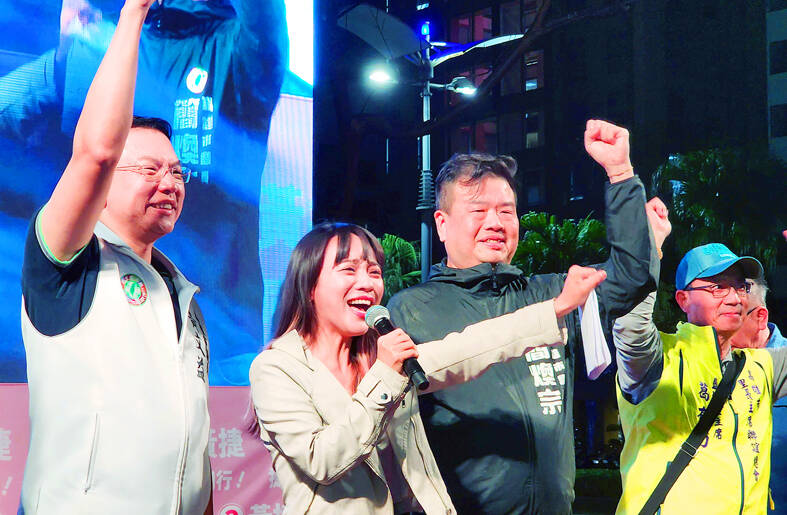
Photo: CNA
Taipei City Councilor Hsu Chiao-hsin (徐巧芯) — who secured the KMT’s nomination in Taipei’s seventh electoral district (Xinyi-Southern Songshan), stopping incumbent KMT Legislator Alex Fai (費鴻泰) from running for a sixth consecutive time — beat DPP Taipei City Councilor Hsu Shu-hua (許淑華).
DPP Legislator Lai Pin-yu (賴品妤) pulled off a surprise victory in 2020, but failed to keep her seat in New Taipei City’s 12th electoral district, losing to New Taipei City Councilor Liao Hsien-hsiang (廖先翔) of the KMT.
KMT Legislator Ma Wen-chun (馬文君) reclaimed her seat in Nantou County’s first electoral district for the fifth consecutive time, despite being accused of leaking confidential files concerning the Indigenous Defense Submarine program and illegally occupying public land. She beat Nantou County Councilor Tsai Ming-hsuan (蔡銘軒) of the DPP.
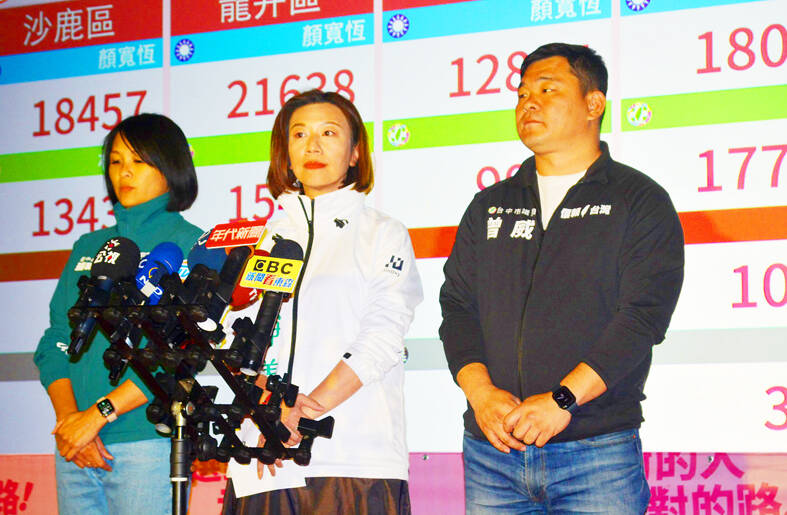
Photo: Chen Chien-chih, Taipei Times
Taitung incumbent DPP Legislator Liu Chao-hao (劉櫂豪), who ran as an independent after losing the party primary to Lai Kun-cheng (賴坤成), lost to KMT challenger Huang Chien-pin (黃建賓).
Former KMT legislator Yen Kuan-heng (顏寬恆) — accused by his opponent, DPP Legislator Lin Ching-yi (林靜儀), of corruption and dishonest property declarations — won in Taichung’s second electoral district.
TPP Legislator Tsai Pi-ru’s (蔡壁如), running in Taichung’s first electoral district, was touted as an exemplary case of KMT-TPP cooperation, gathering support from KMT heavyweights such as Taichung Mayor Lu Shiow-yen (盧秀燕). Tsai lost to Deputy Legislative Speaker Tsai Chi-chang (蔡其昌) of the DPP.
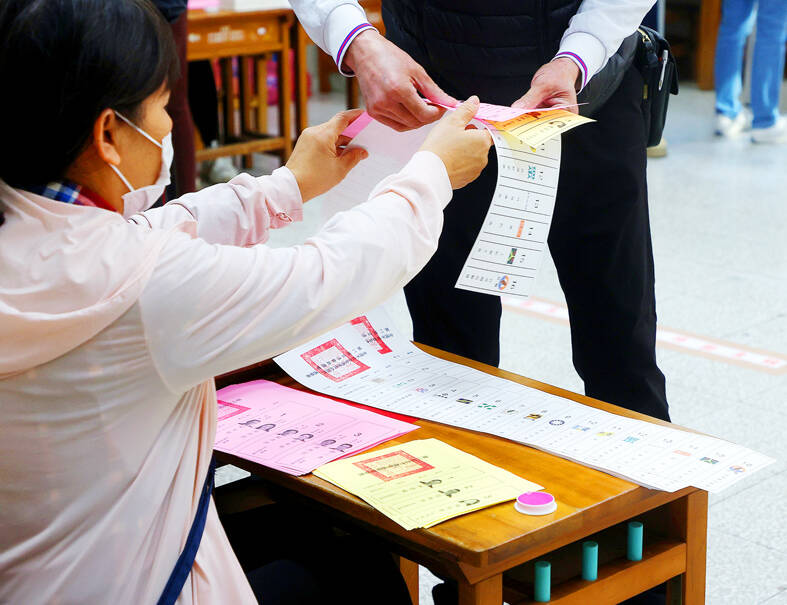
Photo: CNA
The KMT’s Sean Liao (廖偉翔), another candidate endorsed by both the KMT and TPP, beat incumbent DPP Legislator Chang Liao Wan-chien (張廖萬堅) to win Taichung’s first electoral district.
Among the 16 parties that submitted legislator-at-large candidate lists, only three — the DPP, the KMT and the TPP — crossed the 5-percentage-point threshold to be awarded seats in the legislature.
A total of 13 candidates on the DPP’s legislator-at-large candidate list secured seats with the party’s 36.16 percent of party votes.
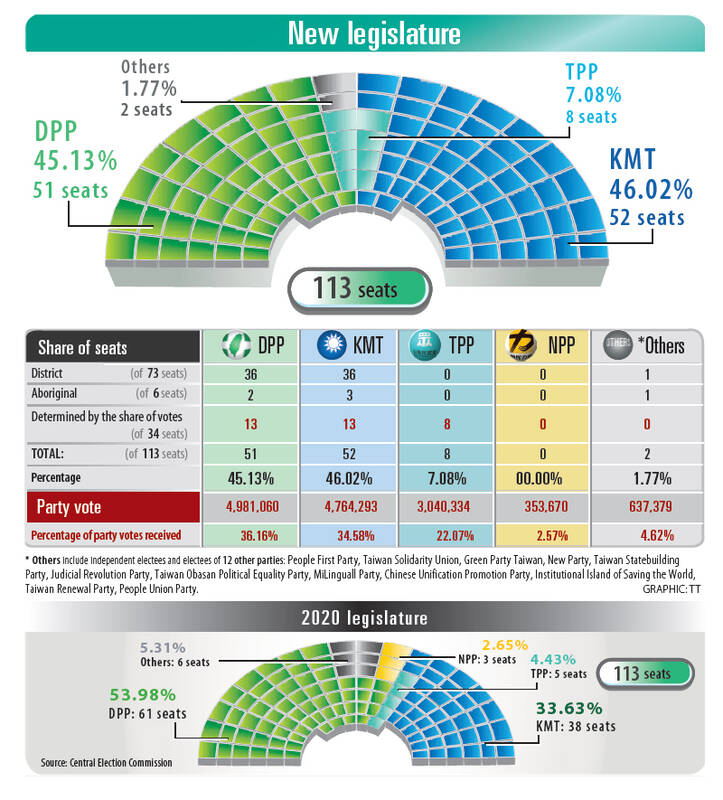
The KMT received 13 seats through 34.58 percent of party votes, while the TPP won eight seats with 22.07 percent of party votes.

DAREDEVIL: Honnold said it had always been a dream of his to climb Taipei 101, while a Netflix producer said the skyscraper was ‘a real icon of this country’ US climber Alex Honnold yesterday took on Taiwan’s tallest building, becoming the first person to scale Taipei 101 without a rope, harness or safety net. Hundreds of spectators gathered at the base of the 101-story skyscraper to watch Honnold, 40, embark on his daredevil feat, which was also broadcast live on Netflix. Dressed in a red T-shirt and yellow custom-made climbing shoes, Honnold swiftly moved up the southeast face of the glass and steel building. At one point, he stepped onto a platform midway up to wave down at fans and onlookers who were taking photos. People watching from inside

A Vietnamese migrant worker yesterday won NT$12 million (US$379,627) on a Lunar New Year scratch card in Kaohsiung as part of Taiwan Lottery Co’s (台灣彩券) “NT$12 Million Grand Fortune” (1200萬大吉利) game. The man was the first top-prize winner of the new game launched on Jan. 6 to mark the Lunar New Year. Three Vietnamese migrant workers visited a Taiwan Lottery shop on Xinyue Street in Kaohsiung’s Gangshan District (崗山), a store representative said. The player bought multiple tickets and, after winning nothing, held the final lottery ticket in one hand and rubbed the store’s statue of the Maitreya Buddha’s belly with the other,

‘NATO-PLUS’: ‘Our strategic partners in the Indo-Pacific are facing increasing aggression by the Chinese Communist Party,’ US Representative Rob Wittman said The US House of Representatives on Monday released its version of the Consolidated Appropriations Act, which includes US$1.15 billion to support security cooperation with Taiwan. The omnibus act, covering US$1.2 trillion of spending, allocates US$1 billion for the Taiwan Security Cooperation Initiative, as well as US$150 million for the replacement of defense articles and reimbursement of defense services provided to Taiwan. The fund allocations were based on the US National Defense Authorization Act for fiscal 2026 that was passed by the US Congress last month and authorized up to US$1 billion to the US Defense Security Cooperation Agency in support of the

‘COMMITTED TO DETERRENCE’: Washington would stand by its allies, but it can only help as much as countries help themselves, Raymond Greene said The US is committed to deterrence in the first island chain, but it should not bear the burden alone, as “freedom is not free,” American Institute in Taiwan Director Raymond Greene said in a speech at the Institute for National Defense and Security Research’s “Strengthening Resilience: Defense as the Engine of Development” seminar in Taipei yesterday. In the speech, titled “Investing Together and a Secure and Prosperous Future,” Greene highlighted the contributions of US President Donald Trump’s administration to Taiwan’s defense efforts, including the establishment of supply chains for drones and autonomous systems, offers of security assistance and the expansion of